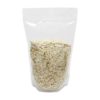Blog
How Much Caffeine is in Green Tea?
Although you might think coffee is the beverage that is most consumed around the world, it’s not. The world’s favorite drink besides water is actually tea. Around 78 percent of the tea consumed internationally is black, and only about 20 percent is green.
Brewing teas require the use of the dried leaves of the Camellia sinensis bush, except herbal teas,. It is, in fact, the amount of oxidation of the leaves that determines the type of tea.
This means it is less processed than most types of tea except for white tea, which is less oxidized. The lower the level of oxidation, the higher the level of antioxidants and beneficial polyphenols.
Green tea and your health
Green tea has been used in traditional Chinese and Indian medicine for centuries and is becoming more and more popular in the United States. These healers used green tea to regulate body temperature, improve heart and mental health, aid digestion, control bleeding and heal wounds.
Research needs to show conclusively that green tea is effective against many ailments, green tea is said to be effective against many illnesses and conditions. Polyphenols present in tea have shown to decrease tumor growth, according to The National Cancer Institute.
It may also serve to protect the skin from the damage caused by UVB radiation. It’s worth noting that in countries that drink the highest amount of green tea, cancer rates are lower. Studies have shown positive effects from green tea on cancer of the bladder, bowel, throat, lung, prostate, breast, ovary, skin and stomach.
There is evidence that green tea has benefits for the heart. In a study of 40,000 Japanese participants, those who drank 5 or more cups of green tea a day were significantly less likely to die, especially from heart disease, than those who drank less than 1 cup of tea a day.
Catechins in green tea are thought to have many protective cardiovascular system benefits. Green tea is linked to modest reductions in ‘bad’ LDL cholesterol. Drinking green tea regularly has been associated with a reduced risk of stroke.
A study run in 2007 found that green tea might be helpful in the treatment of skin disorders such as dandruff and psoriasis. But green tea might also benefit one’s mental state, too. It turns out that one study suggested that green tea benefits the brain’s cognitive functions, particularly working memory.
Research
The researchers found that green tea could show promise in the treatment of cognitive impairments associated with neuropsychiatric disorders such as dementia. Further research suggests that green tea might reduce the risk of Alzheimer’s disease due to a particular component of the tea’s effect on a certain protein present in the disease.
Various other studies have shown that green tea might help to prevent stress, chronic fatigue, and dental cavities. It might also be effective in reducing inflammation in people with arthritis, and in treating skin conditions. These results will require further research.
A nutritional breakdown
If you drink unsweetened green tea, you are drinking a beverage with zero calories. Green tea is a healthy choice thanks to a large number of antioxidants it contains.
Naturally-occurring chemicals called polyphenols are present in tea. In fact, green tea is around 20 to 45 percent polyphenols by weight. 60 to 80 percent of these polyphenols are highly-beneficial catechins. These catechins are antioxidants that are thought to prevent cell damage. Antioxidants are thought to have anti-carcinogenic and anti-inflammatory effects.
How much caffeine does green tea contain?
The caffeine content of any cup of tea, regardless of the type, depends on infusion, and how much tea is used. Green tea contains a fairly small amount of caffeine at about 20 to 45 milligrams for an 8-ounce cup.
This compares with black tea, which has about 50 milligrams per cup, and coffee, which has about 95 milligrams per cup. So how bad is caffeine for you?
The benefits and risks of caffeine
There’s no doubt about it: Americans are crazy for caffeine. But how safe is it? How much is too much? These include reducing the risk of developing Parkinson’s disease, gallstones, and heart-related illnesses. Because it causes the blood vessels to constrict, it might help to relieve headaches.
But it also has negative effects on your health. Drinking caffeinated coffee has a direct link to decreased bone density, which could lead to osteoporosis. Caffeinated drinks can lead to higher blood sugar levels, a problem for people with diabetes. Because caffeine is a diuretic, it can cause dehydration.
The most commonly-known negative effect of caffeine is on sleep. Consuming caffeinated products can stop you from falling asleep and can interfere with deep sleep. Lack of sleep can have serious effects, not the least of which is feeling tired the next day.
With its low levels of caffeine and its possible health benefits, green tea might be a good choice of beverage for you.





